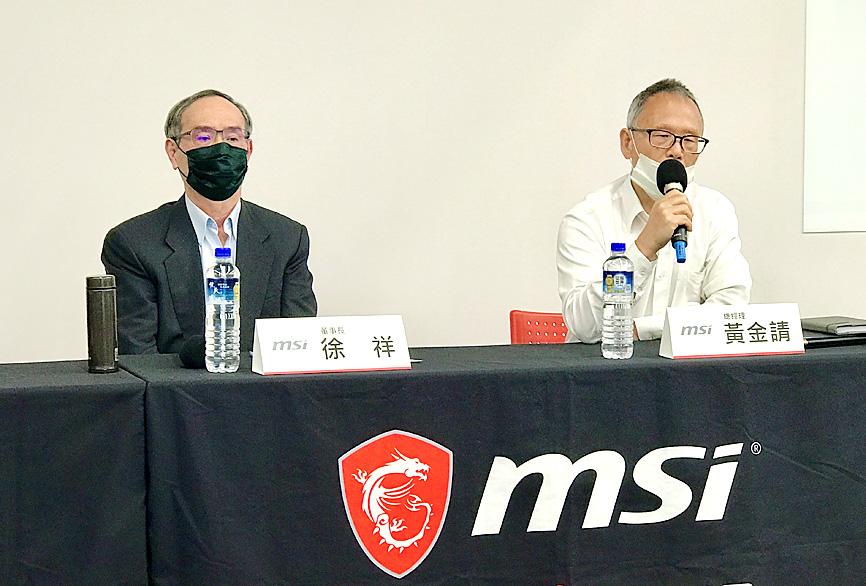Notebook computer maker Micro-Star International Co (MSI, 微星科技) yesterday said the Russia-Ukraine war is hurting consumer spending in Europe, but that it still aims to grow revenue by double-digit percentage points this year amid strong demand from gamers and enterprises in the post-COVID-19 era.
MSI, which primarily makes gaming notebook computers and motherboards, last year saw its revenue soar 37.8 percent annually to a record NT$201.81 billion (US$7.07 billion), as the COVID-19 pandemic spurred demand for computers and booming cryptomining activity drove sales of its graphics cards.
The growth looks sustainable this quarter, but the impact of the Russia-Ukraine war became evident this month, dampening demand for non-essential goods, MSI said.

Photo courtesy of Micro-Star International Co
“We are seeing consumers in European countries, including Germany, tightening their purse strings after the Russia-Ukraine war erupted. We are seeing buying sentiment dip significantly by double-digit percentage points in March,” MSI chairman Hsiang Hsu (徐祥) told investors during a virtual conference yesterday. “We believe the second quarter will be the trough of this year. It is also because the second quarter is usually a slow season.”
For the full year, the geopolitical tensions would affect the New Taipei City-based company’s revenue and profits to some extent this year, Hsu said.
Russia accounted for about 5 percent of MSI’s total revenue last year, he said.
MSI expects revenue to regain momentum in the second half of this year, benefiting from robust demand for gaming and commercial notebook computers, as well as higher motherboard demand following the launches of new graphics cards and CPUs by Intel Corp, Nvidia Inc and Advanced Micro Devices Inc, Hsu said.
Addressing investors’ concern about potential losses from the ruble’s depreciation, Hsu said MSI did not expect any major impact from the Russian currency’s fall, as most of the company’s accounts receivable from Russian clients have built hedge positions against foreign exchange volatility.
There are some bright spots, though, MSI president Huang Chin-ching (黃金請) said.
“The supply of key components along the supply channel has been improving, compared with a supply crunch last year,” Huang said. “Supply constraints are almost resolved, with only certain key components, such as power chips, remaining tight currently.”
Channel inventories also rebounded to about two to four weeks this month, from one to two weeks last year, Huang said.
However, there is still some catching-up to do to reach the healthy level of six to eight weeks, he added.
MSI’s board of directors on Monday approved a plan to distribute a cash dividend of NT$10.5 per common share, an all-time high. That represented a payout ratio of about 52.42 percent based on the company’s earnings of NT$20.03 per share last year, lower than 65 percent in the previous year.
MSI said it is allocating some capital to fund new capacity expansion at its factories in Taiwan and China in response to rapidly growing demand.
The company has also invested in a new production line in Taiwan to cope with US-China trade disputes, it said.

Merida Industry Co (美利達) has seen signs of recovery in the US and European markets this year, as customers are gradually depleting their inventories, the bicycle maker told shareholders yesterday. Given robust growth in new orders at its Taiwanese factory, coupled with its subsidiaries’ improving performance, Merida said it remains confident about the bicycle market’s prospects and expects steady growth in its core business this year. CAUTION ON CHINA However, the company must handle the Chinese market with great caution, as sales of road bikes there have declined significantly, affecting its revenue and profitability, Merida said in a statement, adding that it would

RISING: Strong exports, and life insurance companies’ efforts to manage currency risks indicates the NT dollar would eventually pass the 29 level, an expert said The New Taiwan dollar yesterday rallied to its strongest in three years amid inflows to the nation’s stock market and broad-based weakness in the US dollar. Exporter sales of the US currency and a repatriation of funds from local asset managers also played a role, said two traders, who asked not to be identified as they were not authorized to speak publicly. State-owned banks were seen buying the greenback yesterday, but only at a moderate scale, the traders said. The local currency gained 0.77 percent, outperforming almost all of its Asian peers, to close at NT$29.165 per US dollar in Taipei trading yesterday. The

RECORD LOW: Global firms’ increased inventories, tariff disputes not yet impacting Taiwan and new graduates not yet entering the market contributed to the decrease Taiwan’s unemployment rate last month dropped to 3.3 percent, the lowest for the month in 25 years, as strong exports and resilient domestic demand boosted hiring across various sectors, the Directorate-General of Budget, Accounting and Statistics (DGBAS) said yesterday. After seasonal adjustments, the jobless rate eased to 3.34 percent, the best performance in 24 years, suggesting a stable labor market, although a mild increase is expected with the graduation season from this month through August, the statistics agency said. “Potential shocks from tariff disputes between the US and China have yet to affect Taiwan’s job market,” Census Department Deputy Director Tan Wen-ling

UNCERTAINTIES: The world’s biggest chip packager and tester is closely monitoring the US’ tariff policy before making any capacity adjustments, a company official said ASE Technology Holding Inc (日月光投控), the world’s biggest chip packager and tester, yesterday said it is cautiously evaluating new advanced packaging capacity expansion in the US in response to customers’ requests amid uncertainties about the US’ tariff policy. Compared with its semiconductor peers, ASE has been relatively prudent about building new capacity in the US. However, the company is adjusting its global manufacturing footprint expansion after US President Donald Trump announced “reciprocal” tariffs in April, and new import duties targeting semiconductors and other items that are vital to national security. ASE subsidiary Siliconware Precision Industries Co (SPIL, 矽品精密) is participating in Nvidia